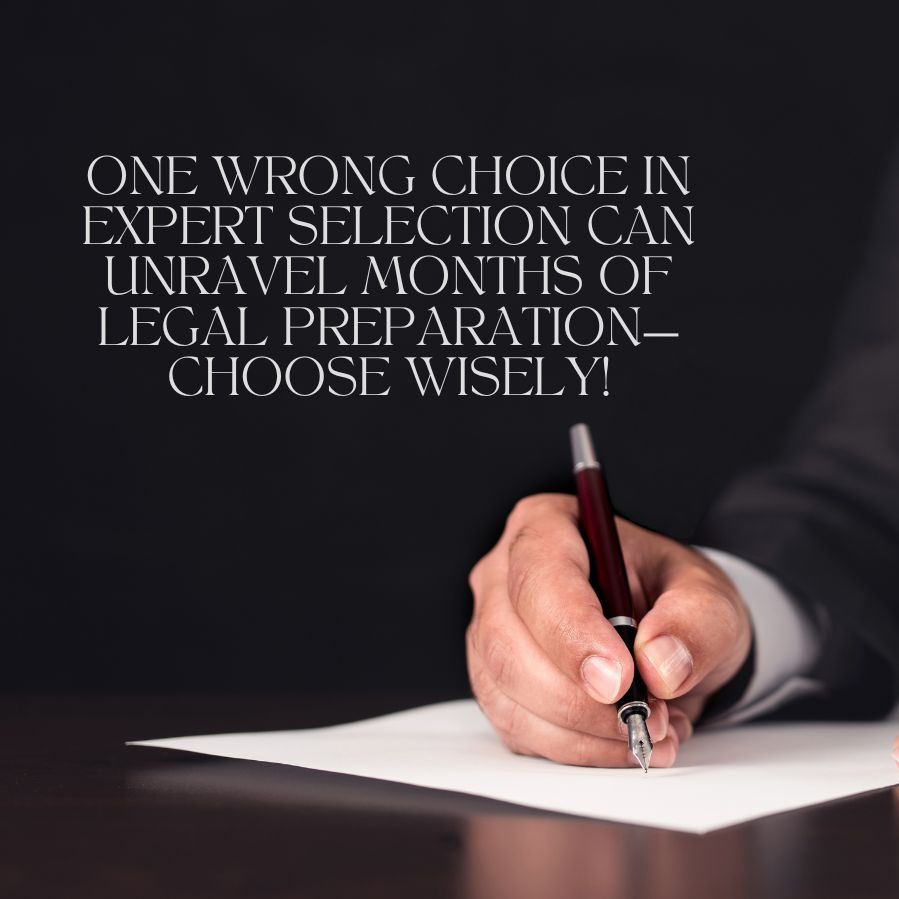How to Avoid Mistakes When Choosing a Valuation Expert
We’ve been in your shoes—racing against the clock to find the right valuation expert witness, juggling deadlines, and feeling the weight of a high-stakes case bearing down. Inexperienced patent litigators often learn the hard way that the wrong expert witness can unravel months of preparation through a single cross-examination.
It’s not just about finding someone who knows the right valuation expert in the field; it’s about securing an expert who can stand firm under pressure, communicate complex ideas clearly, and bolster a case without breaking the budget.
If you’re feeling the crunch and worried about making a costly mistake, you’re not alone. This article is here to help you navigate the expert selection process with confidence, saving you time, stress, and, most importantly, your case’s integrity.
In high-stakes financial litigation, the selection of a valuation expert witness can make or break a case. Valuation experts are critical for interpreting complex financial data, estimating damages, and guiding courts through intricate monetary disputes.

However, improper vetting of these valuation expert witnesses can lead to costly mistakes, ultimately compromising the case.
This article explores strategies to identify and select courtroom-ready valuation experts for complex financial matters, ensuring their testimony stands up to scrutiny.
Choosing the right valuation expert witness for complex financial litigation is essential to avoid costly mistakes.
This article discusses how to overcome vetting difficulties, address bias and conflicts of interest, and manage cost considerations when selecting expert witnesses for legal cases.
Learn how to streamline the process with effective expert litigation support services.
The Role of Valuation Experts in Financial Litigation
Valuation experts play a pivotal role in cases involving financial disputes, including:
Patent litigation support services are used to determine the value of intellectual property.
Damages expert assessments for lost profits or breach of contract.
Business valuation in mergers, acquisitions, or bankruptcies.
Their testimony helps clarify complex financial issues for judges and juries, but only if the expert is well-prepared, capable, and credible.
Common Challenges in Selecting Valuation Expert Witnesses
1. Time Constraints
Finding a valuation expert witness under tight deadlines is a common challenge. Complex financial litigation often requires niche expertise, and rushing the vetting process increases the risk of selecting an unsuitable expert.

2. Limited Pool of Experts
Specialized cases, such as patent litigation or industry-specific financial disputes, may have a small pool of qualified experts. Top valuation experts are often in high demand, limiting their availability.
3. Cost Considerations
High-quality experts come with substantial fees, making it critical to balance the expert’s value against the litigation budget.
4. Vetting Difficulties
Verifying a valuation expert’s credentials, past testimony, and professional experience is time-consuming. Incomplete or misleading information in CVs or databases can hinder the process.
Steps to Vet Valuation Expert Witnesses
1. Identify the Specific Expertise Needed
Each case requires unique expertise. For example:
Patent litigation expert witness for infringement cases needs knowledge of intellectual property valuation.
Damages experts must have experience in quantifying financial losses.
Understanding the case’s nuances helps narrow down the search to experts with the right qualifications.
2. Research Potential Experts
Begin your search using multiple avenues:
Personal and professional networks
Expert witness databases and directories
Litigation support services like the ExpertConnect Litigation Support
These resources provide access to pre-screened experts with prior testimony experience.
3. Evaluate Credentials and Experience
Consider the following when evaluating potential experts:
Educational background: Look for advanced degrees in finance, economics, or a related field.
Professional certifications: Credentials like CFA, ASA, or CVA indicate technical expertise.
Litigation experience: Confirm they have previously served as expert witnesses in court.
4. Screen for Bias and Conflicts of Interest
Ensure the expert is impartial and has no affiliations with the opposing party. Even subtle conflicts of interest can undermine the expert’s credibility.
5. Review Prior Testimony
Analyze the valuation expert’s performance in previous cases. Look for consistency, clarity under cross-examination, and their ability to convey complex financial concepts to a lay audience.
6. Assess Communication Skills
An expert’s ability to explain their valuation methods clearly is crucial. During interviews, ask them to break down complex methodologies to evaluate their communication effectiveness.
7. Test Their Methodologies
Provide the expert with relevant case materials and request a preliminary assessment. This step helps you evaluate their approach and identify potential weaknesses before trial.
8. Consider Cost and Availability
Top experts often charge premium rates. Evaluate whether their expertise justifies the cost and ensure their availability aligns with your case’s timeline.
Avoiding Common Mistakes in Expert SelectionOveremphasis on Academic Credentials
While academic qualifications are important, practical valuation experience in relevant industries often carries more weight in complex financial cases.
Insufficient Industry Knowledge
An expert must have deep familiarity with the industry involved in the litigation.
For instance, valuation experts for complex financial litigation in tech patents should understand the technology and current market dynamics.
Lack of Litigation Experience
Expert witnesses need prior testimony experience to handle the pressures of cross-examination and maintain composure in court.
Methodological Errors
Experts must apply the appropriate valuation methods consistently. Errors or inconsistencies in methodologies can lead to their testimony being discredited.
Poor Communication Skills
Even the most qualified experts must effectively communicate complex financial concepts in a way that judges and juries can understand.
The Importance of Litigation Support Services
Law firms facing challenges in finding the right expert witness can benefit from patent litigation support services and expert witness networks. These services provide access to:
Pre-screened experts with proven track records.
Courtroom-ready expert witnesses experienced in litigation.
Comprehensive vetting processes, saving time and ensuring quality.
Advantages of Using a Vetted Expert Witness Network
Efficiency: Access to a curated list of qualified experts reduces search time.
Quality Assurance: Experts are pre-vetted for credentials, experience, and impartiality.
Cost Management: Services often provide a range of experts to fit various budgets.
Conclusion: Strengthening Your Case with the Right Expert
Selecting the right valuation expert witness for complex financial litigation requires a thorough vetting process. By identifying specific expertise, evaluating credentials, reviewing prior testimony, and testing methodologies, law firms can avoid costly mistakes and strengthen their cases.
For streamlined expert selection, consider using services like ExpertConnect Litigation Support. Their vetted expert witness network connects law firms with courtroom-experienced experts, ensuring your case benefits from credible and reliable testimony. Visit their website today to explore their directory of pre-screened valuation experts at no cost.